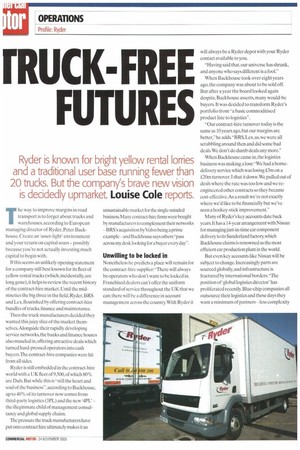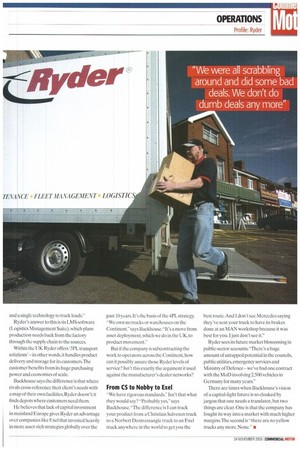TRUCK-FREE FUTURES
Page 68

Page 69

If you've noticed an error in this article please click here to report it so we can fix it.
Ryder is known for bright yellow rental lorries and a traditional user base running fewer than 20 truas. But the company's brave new vision is decidedly upmarket. Louise Cole reports.
The way to improve margins in road transport is to forget about trucks and warehouses, according to European managing director of Ryder, Peter Backhouse. Create an 'asset-light' environment and your return on capital soars— possibly because you're not actually investing much capital to begin with.
If this seems an unlikely opening statement for a company still best known for its fleet of yellow rental trucks (which, incidentally, are long gone), it helps to review the recent history of the contract-hire market. Until the midnineties the big three in the field, Ryder, BRS and Lex, flourished by offering contract-hire bundles of trucks. finance and maintenance.
Then the truck manufacturers decided they wanted this juicy slice of the market themselves. Alongside their rapidly developing service networks, the banks and finance houses also muscled in, offering attractive deals which turned hard-pressed operators into cash buyers.The contract-hire companies were hit from all sides.
Ryder is still embedded in the contract-hire world with a UK fleet of 9,500, of which 80% are Dafs. But while this is "still the heart and soul of the business", according to Backhouse, up to 40% of its turnover now comes from third-party logistics (3PL) and the new '4PU — the illegitimate child of management consultancy and global supply chains.
The pressure the truck manufacturers have put onto contract hire ultimately makes it an unsustainable market for the single-minded business Many contract-hire firms were bought by manufacturers to complement their networks —BRS's acquisition by Volvo being a prime example— and Backhouse says others "pass across my desk looking for a buyer every day".
Unwilling to be locked in
Nonetheless he predicts a place will remain for the contract-hire supplier: "There will always be operators who don't want to be locked in. Franchised dealers can't offer the uniform standard of service throughout the UK that we can; there will be a difference in account management across the country. With Ryder it will always be a Ryder depot with your Ryder contact available to you.
"Having said that, our universe has shrunk, and anyone who says different is a fool."
When Backhouse took over eight years ago, the company was about to be sold off. But after a year the board looked again despite, Backhouse asserts, many would-be buyers. It was decided to transform Ryder's portfolio from "a basic commoditised product line to logistics".
"Our contract-hire turnover today is the same as 10 years ago, but our margins are better," he adds."BRS, Lex, us, we were all scrabbling around then and did some bad deals We don't do dumb deals any more."
When Backhouse came in, the logistics business was making a loss:"We had a homedelivery service which was losing Dm on a £20m turnover. I shut it down. We pulled out of deals where the rate was too low and we reengineered other contracts so they became cost-effective. As a result we're not exactly where we'd like to be financially but we've seen a hockey-stick improvement."
Many of Ryder's key accounts date back years. Ii has a 14-year arrangement with Nissan for managing just-in-time car component delivery to its Sunderland factor which Backhouse claims is renowned as the most efficient car production plant in the world.
But even key accounts like Nissan will be subject to change. Increasingly parts are sourced globally, and infrastructure is fractured by international borders."The position of 'global logistics director' has proliferated recently. Blue-chip companies all outsource their logistics and these days they want a minimum of partners-less complexity and a single technology to track loath" Ryder's answer to this is its LMS software (Logistics Management Suite), which plans production needs back from the factory through the supply chain to the sources.
Within the UK Ryder offers `3PL transport solutions' in other words, it handles product delivery and storage for its custorncrs.The customer benefits from its huge purchasing power and economies of scale.
Backhouse says the difference is that where rivals cross-reference their client's needs with a map of their own facilities, Ryder doesn't; it finds depots where customers need them.
He believes that lack of capital investment in mainland Europe gives Ryder an advantage over companies like Exel that invested heavily in more asset-rich strategies globally over the past 10 years. It's the basis of the 4PL strategy. "We own no trucks or warehouses on the Continent," says Backhouse."It's a move from asset deployment, which we do in the UK, to product movement."
But if the company is subcontracting the work to operators across the Continent, how can it possibly assure those Ryder levels of service? isn't this exactly the argument it used against the manufacturer's dealer networks?
From CS to Nobby to Exel
We have rigorous standards." Isn't that what they would say? "Probably yes," says Backhouse."The difference is I can track your product from a Christian Salvesen truck to a Norbert Dentressangle truck to an Exel truck anywhere in the world to get you the best route. And I don't see Mercedes saying they've sent your truck to have its brakes done at an MAN workshop because it was best for youl just don't see it."
Ryder sees its future market blossoming in public-sector accounts. "There's a huge amount of untapped potential in the councils, public utilities, emergency services and Ministry of Defence — we've had one contract with the MoD involving 2,500 vehicles in Germany for many years."
There are times when Backhouse's vision of a capital-light future is so cloaked by jargon that one needs a translator, but two things are clear. One is that the company has fought its way into a market with much higher margins.The second is "there are no yellow trucks any more. None." •






































































































































































































